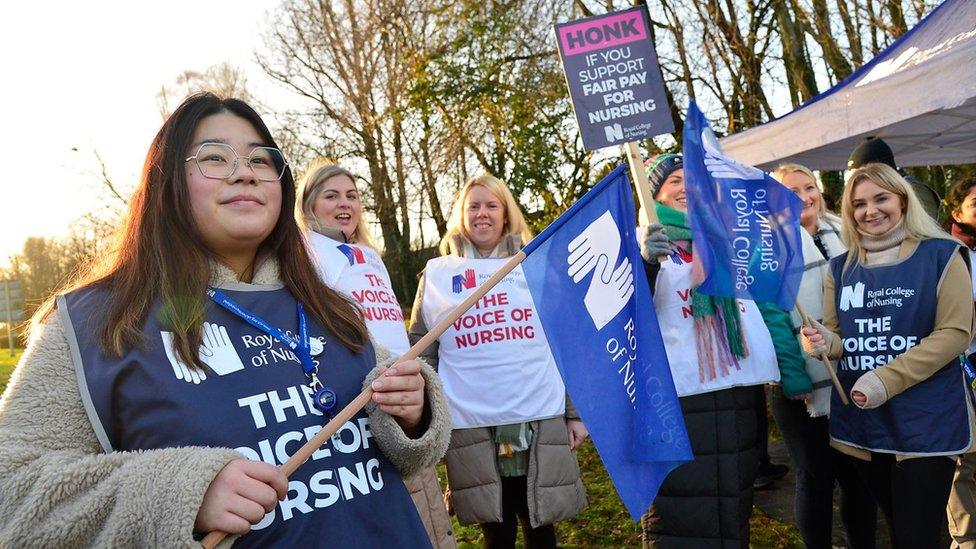NI strikes: Teaching staff and healthcare workers on picket lines
- Published
Striking workers say 'enough is enough'
Thousands of education and health workers in Northern Ireland have taken part in strike action on Tuesday.
Four teaching unions took part in a half-day strike over pay - their first walkout in six years - with most schools closed until midday.
For health and public service unions Unite, Unison, Nipsa and GMB it was further action in a pay dispute.
Teachers, nurses, ambulance and hospital staff have been taking to picket lines.
The Department of Education said guidance had been issued to help principals assess and prepare for strike action.
It is understood union representatives are to meet the Department of Education later this week for further talks.
The Department of Health said it fully understood the frustration of staff but there was no scope for resolution at local level.
'Backed into a corner'
The four teaching unions involved were the National Association of Schoolmasters and Union of Women Teachers (NASUWT); the Irish National Teachers' Organisation (INTO); the Ulster Teachers Union (UTU) and the National Education Union (NEU).
The NASUWT has been calling for a 12% increase in salaries, following deadlock over a pay deal for the past year.
In Northern Ireland teachers were offered a 3.2% rise spread over two years from 2021 to 2023.
But unions said that due to changes in pay scales many teachers would get less than 3.2%.
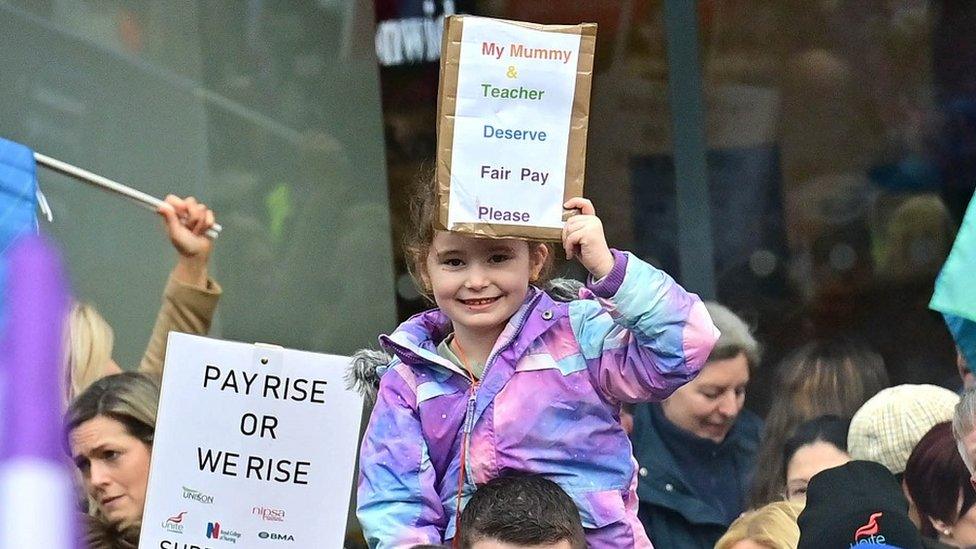
Dr Patrick Roach, NASUWT general secretary, said teachers had been left with no choice.
"Our members are not prepared to stand by while their pay packets shrink and their living costs rise," he said.
"The Department of Education and employers must bring forward a substantially improved pay offer if they want to see an end to this dispute."
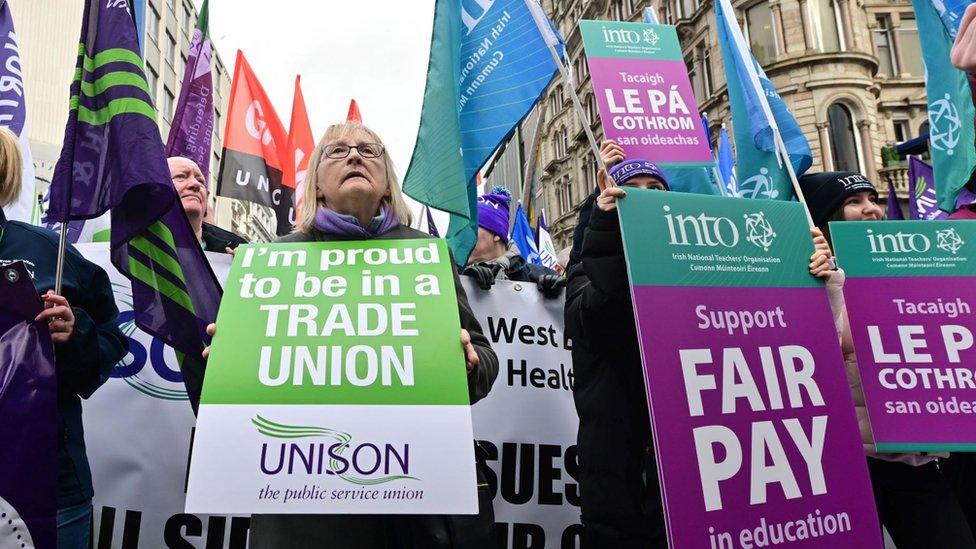
Members of multiple trade unions were present at Belfast City Hall on Tuesday morning
At Belfast City Hall, teacher Emer Bloomer described the strike as a "show of solidarity".
"All unions are uniting to say none of us are happy at the minute, it can't continue like this and something has to be done," she added.
Healthcare workers Orlaigh Sewell and Lisa Heaney said they were striking "to save the NHS".
"They're stripping it down piece by piece," Orlaigh explained. "At the end of the day, it has to be safe for patients".
Health visitor Lisa Heaney added: "There's more demands, there's more support needed for the families we're going out to visit and we don't have the staff to facilitate that."
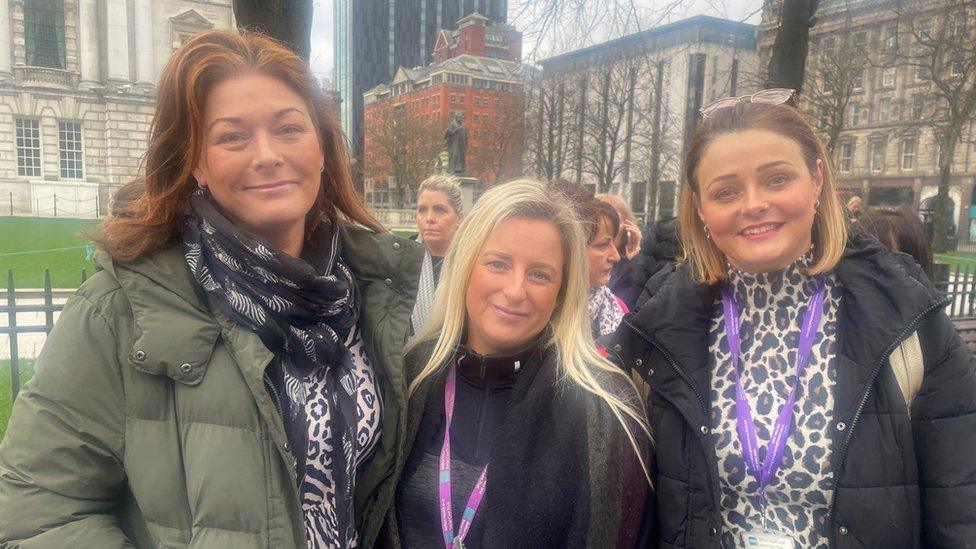
Health workers Orlaigh Sewell (left) and Lisa Heaney (middle) gathered outside Belfast City Hall
Fionnuala McTaggart, who has been teaching in north Belfast for three years, said there has been a noticeable increase in her workload that can be "really overwhelming at times".
Her school, along with many others, opened from 12.00 GMT, to allow children to access free school meals.
"It's not this easy job that people make it out to be, you're not just out colouring with kids all day, you're doing real work that's hard and meaningful and important," she told BBC News NI.


Without a Stormont executive and extra money in the education budget it's hard to see how the teachers' pay dispute can be resolved.
The problem is we don't know where the money would come from for any revised pay deal.
The Department of Education has pointed out that the education budget is under real pressure.
This may be the first action of many but with no ministers in place it's hard to see who is listening.

Edel McInerney, vice president of the NEU Northern Ireland, said: "It's been such a paltry sum that's been offered that actually in fact it's a pay cut that they're offering us, not a pay deal - we're looking for fair pay.
"They [the Department of Education] need to think outside the box, they need to see where money can be saved so that the heart of education - the teachers - are remunerated properly," she said.
Gerry Murphy, from INTO, said teachers had been backed into a corner while the UTU's Jacqui White said the unprecedented move was a reflection of the strength of feeling.
'Financial pressures'
The Department of Education said there had been active engagement between managers and teachers about pay.
But the statement said negotiations were taking place at a time of growing and unprecedented financial pressures within the education sector.
It said management remained committed to reaching a resolution that ensured teachers were fairly remunerated.
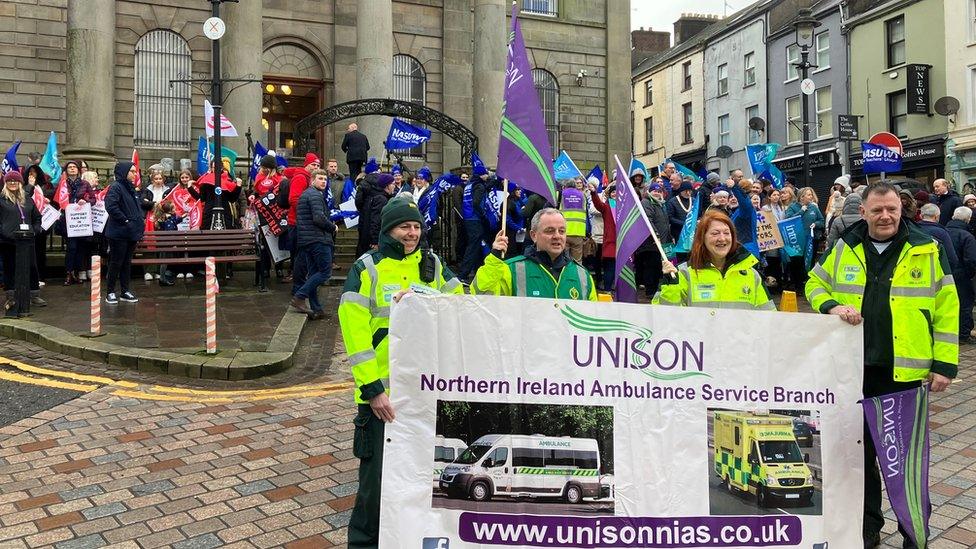
In Omagh, workers gathered outside the courthouse as strikes continue
Teachers were joined at a number of rallies across Northern Ireland by striking workers from the health unions.
Workers were told they would get a 2022-23 pay award of £1,400, but unions said this would not settle the dispute as it was lower than inflation.
In January, more than 20,000 healthcare staff in Northern Ireland took part in a one-day strike.

Teaching staff across Northern Ireland walked out until midday
The Department of Health said the strikes would undoubtedly impacts patient care.
But it added that it fully understood the frustration of staff who continued to work in extremely challenging circumstances.
"This a national dispute which is only resolvable at national level. Northern Ireland has a policy of pay parity with England HSC workers covered by the Agenda for Change framework," the department said.
"Given that policy position, the absence of ministers and current budgetary realities, there is no scope for a resolution at local level."
- Published28 November 2022
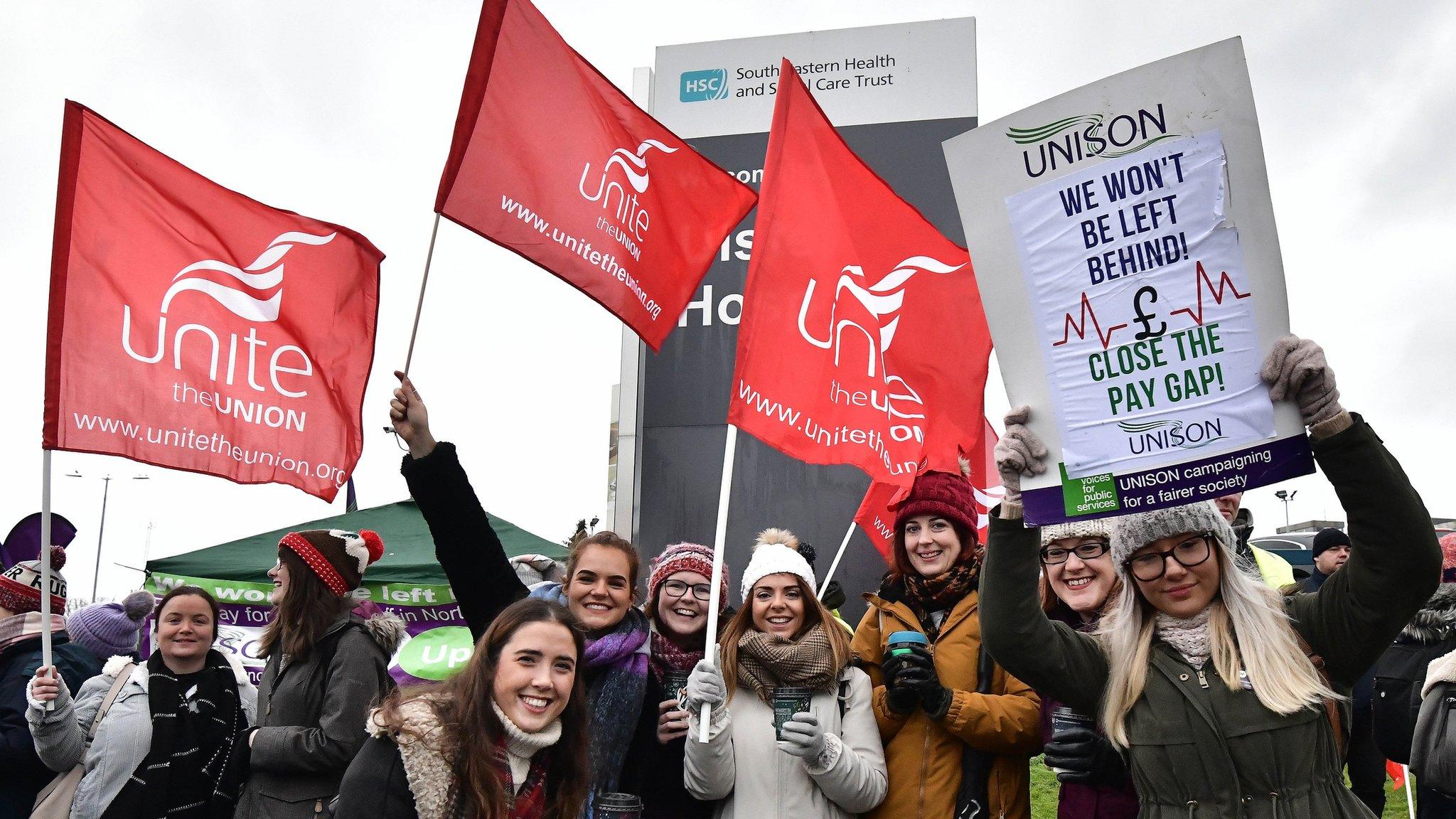
- Published1 August 2023

- Published8 December 2022
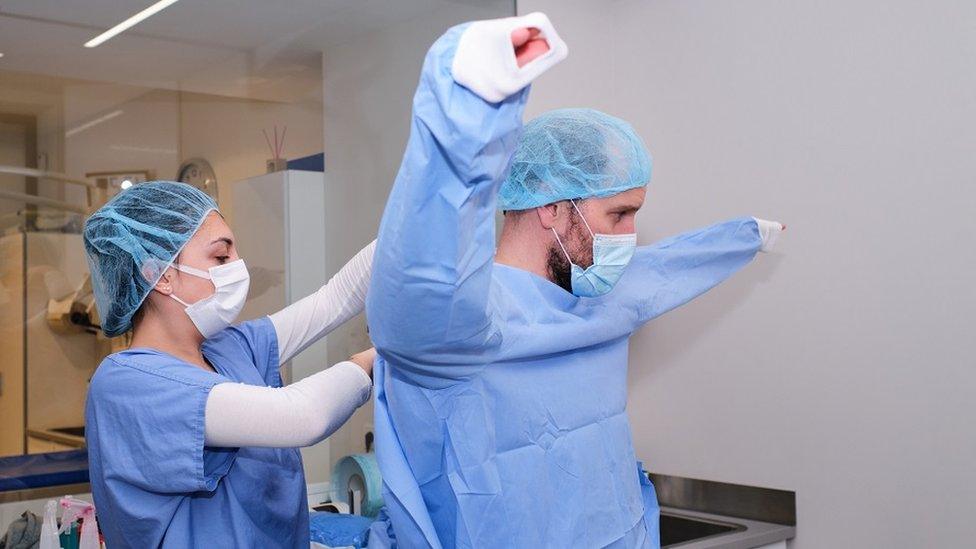
- Published21 December 2022
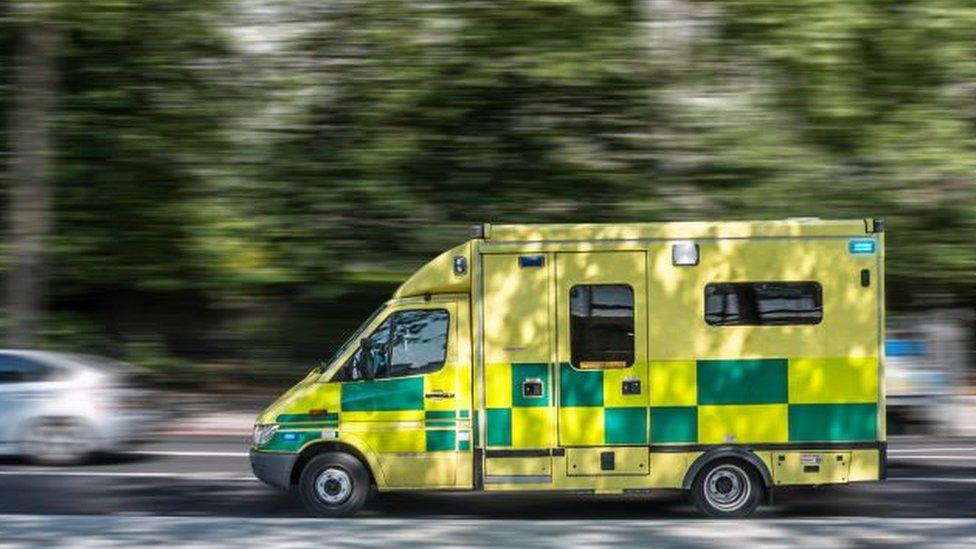
- Published20 December 2022
